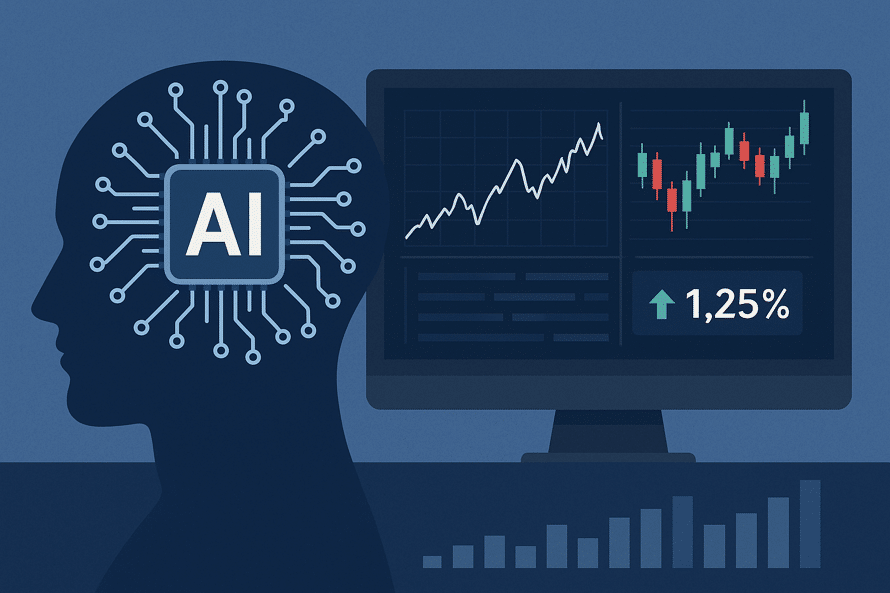AI in the Stock Market: How Machine Learning Is Changing the Game for Indian Investors

Introduction: A New Era in Stock Market Investing
The world of stock trading is no longer ruled by gut instincts and broker tips. Welcome to the AI revolution—where data, algorithms, and automation are taking center stage.
Artificial Intelligence (AI) and Machine Learning (ML) are transforming how trades happen, how portfolios are managed, and even how individual investors like you and me make decisions.
If you’re wondering whether these technologies are only for big institutions like BlackRock or Goldman Sachs—think again. AI tools are rapidly becoming more accessible to retail investors in India, and it’s time we understood how to use them smartly.
What Is AI and Machine Learning in Finance?
In simple terms:
- Artificial Intelligence (AI): Machines that mimic human thinking.
- Machine Learning (ML): A branch of AI where machines learn from data to make predictions.
In the stock market, these technologies:
- Analyze massive amounts of data
- Predict price movements
- Automate trading strategies
- Personalize investment advice
And they do all of this faster and more accurately than humans ever could.
Real-World Applications of AI in the Stock Market
Let’s break down the key areas where AI is already transforming stock market operations.
1. Algorithmic & High-Frequency Trading (HFT)
AI-driven trading bots now execute thousands of trades in milliseconds.
- Example: Firms like Citadel and XTX Markets use AI not just for speed, but for strategy refinement.
- For retail investors: Platforms are starting to offer algorithmic tools and smart order placements.
2. Predictive Analytics
AI systems process:
- Historical prices
- Company earnings
- Economic indicators
- Even Twitter and Reddit chatter
to predict stock movements with surprising accuracy.
- Example: AI predicted Tesla’s stock surge by analyzing social sentiment before earnings reports.
3. Sentiment Analysis with NLP
Natural Language Processing (NLP) is a game changer. It reads the emotional tone of:
- News headlines
- Tweets
- Financial statements
and translates it into trading signals.
- Example: Tools like StockGeist.ai or ChatGPT can now forecast trends based on media sentiment.
4. Smart Portfolio Management
AI can automatically rebalance your portfolio based on:
- Risk appetite
- Market volatility
- Personal goals
- Example: BlackRock’s AI tool, Aladdin, is used by fund managers globally to manage trillions in assets.
Now, Indian robo-advisors are offering similar tech—like Scripbox, Kuvera, or Groww’s smart suggestions.
5. Fraud Detection & Anomaly Alerts
AI doesn’t just make money—it also protects it.
It detects:
- Insider trading
- Unusual spikes in volume
- Price manipulation
- Transaction fraud
Banks and brokerages in India are increasingly using AI to spot shady activities before they hurt your investment.
The Human-AI Partnership: Not Either/Or
AI is fast, powerful, and logical—but it’s not human.
It:
- Lacks emotional intelligence
- Struggles with black swan events (like COVID)
- Can’t yet factor in local news that hasn’t been digitized
That’s where you come in.
The future of investing is about AI + Human Judgment—not one replacing the other.
Pros and Cons of AI-Driven Investing
| Pros | Cons |
|---|---|
| Super fast execution | Can increase market volatility |
| Emotion-free trading | Black-box systems lack transparency |
| Personalized advice | Heavily relies on historical data |
| Fraud and anomaly detection | Risk of herd behavior if many use the same model |
| Affordable access via robo-advisors | Data privacy and ethical concerns |
What It Means for Indian Retail Investors
The best part? You don’t need to be a quant or a coder.
How to Use AI in Your Investing:
- Use ChatGPT: Analyze earnings reports or summarize market news.
- Explore AI-driven ETFs: These funds use machine learning to select top-performing stocks.
- Use tools like Trendlyne or StockEdge: They offer sentiment analysis and back-tested strategies using AI.
What’s Next: GenAI and Quantum Investing?
- Generative AI (like ChatGPT): Can create custom investment reports, run simulations, and provide natural-language financial advice.
- Quantum Computing (future): Will boost the speed of trading decisions 100X, simulating millions of scenarios in real time.
We’re still a few years away from widespread adoption in India, but these are trends to watch.
Ethical and Regulatory Challenges
AI’s growing role comes with concerns:
- Bias in data: Historical bias can creep into model predictions.
- Flash crashes: When all AIs sell at once, panic spreads faster than ever.
- Lack of explainability: “Why did the AI recommend that stock?”—a question with no clear answer.
- Privacy issues: Who owns your trading data?
Indian regulators like SEBI are actively evaluating frameworks to manage AI-based systems and ensure transparency.
Conclusion
AI is no longer science fiction—it’s your new investing partner.
For Indian investors, the opportunity is massive:
- Better tools
- Smarter strategies
- More accessible insights
But don’t blindly trust every app or signal. Ask questions, do your research, and combine tech with your own wisdom.
FAQs
Can retail investors use AI for trading?
Yes! there are apps who use AI to suggest portfolios based on your profile.
Is AI better than a human stock analyst?
AI is faster and less emotional, but it lacks intuition and context. A hybrid approach works best.
Will AI replace human traders?
Not completely. AI will handle data-heavy tasks, but humans will always be needed for strategy and ethics.
Is AI trading legal in India?
Yes, but under SEBI’s guidelines. Algorithmic trading is allowed with proper disclosures and risk controls.
Is it risky to follow AI investment advice?
It can be. Always understand how the tool works, diversify your investments, and never rely on one model or app.




